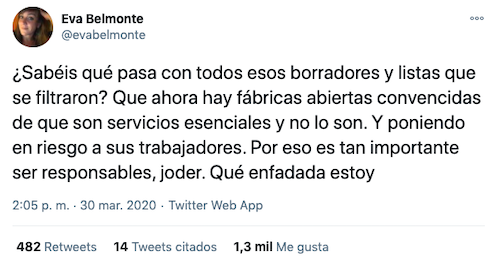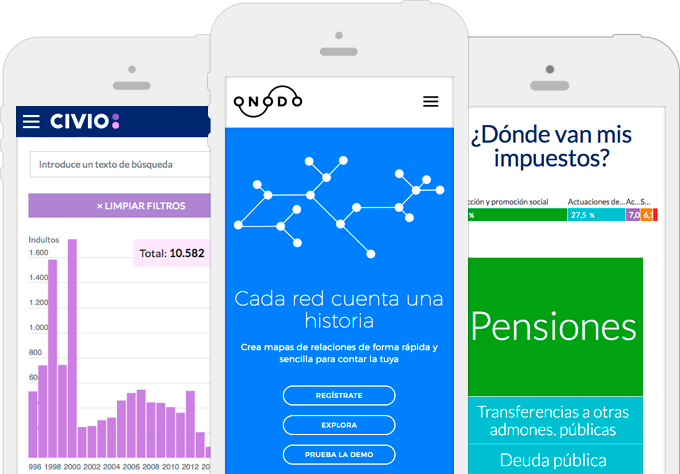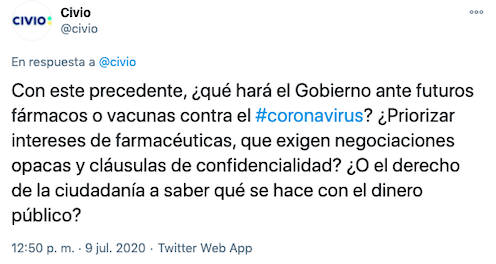Annual Report 2020
Management Report 2020
We hold public institutions accountable, and with this report, we lead by way of example. Read in detail about what we’ve done over the previous year, defined by the impact of COVID.
Public service journalism with you at the core
We are an independent, non-profit organisation founded in 2012. We believe that society and public administration can become fairer, more inclusive and more efficient for us all if we know about the decisions that affect us, how they are made, how they are applied and the results achieved.
The world has changed a lot this year. Us too, to an extent, although our goals and commitments remain the same. Here’s a candid look behind the scenes at our organisation. With it, we seek to help you better understand how we work, contextualising what we’ve done in 2020, how and why.
This is our Seventh Management Report, an exercise we undertake each year with enthusiasm, honesty and a critical eye in order to uphold the trust that so many people have placed in us, and to win more people over every day. You can also read the reports from 2019, 2018, 2017, 2016, 2015 and 2014).
Response to COVID
In the wake of this wretched virus, one of the main protagonists this year was the Official State Gazette or BOE in Spanish. Never before have so many people awaited the publication of the official gazette, to find answers in the face of so much uncertainty. We had to demonstrate that, when the time came around when we most needed clear and sound information about public decisions, we were prepared.
- We have published around 150 public interest reports and analyses on the most important measures in response to coronavirus. We’ve broken down and explained over a hundred ordinary BOEs and around twenty extraordinary gazettes, many at inconvenient hours. Such as Sunday 29 March when, after 11 pm, we still didn’t know what exactly had been deemed ‘essential activities’ that determined who could work and who not the next day. Or those never-ending macro-decrees changing self-employed people’s contribution payments, or maybe the rights to televise football matches. Or complex packages of economic measures that affected millions of people.

-
With the public’s attention drawn to the BOE more than ever before, we found ourselves with a responsibility to dot many i’s. We noticed once again that assuming information to be accurate, even when other media outlets were doing so, was a dangerous game unless published in the BOE. We had to react to viral messages that, behind a ‘the BOE says that…’ tagline, concealed a major hoax. We warned that there were town councils and security entities delivering guidelines that were inaccurate or beyond their remit, such as what one could or couldn’t buy. And we highlighted contradictions such as the fact that no regulation specifically stated that dogs could be walked, although Sánchez announced as much on live TV. Or remarkable occurrences, such as when dancing was banned.
-
Questions regarding the lifting of lockdown restrictions and healthcare ruled the day, and our fact sheets, maps and FAQs were there to help. The 2,700 questions answered individually by email are a reflection of the extra effort that has gone into these recent months. Today, our bureau remains open for any enquiries related to public aid and welfare benefits. The Civio Community has proven an invaluable hub for our readers to meet, find information, and exchange ideas.
-
Like others, we have also been asking ourselves what we can do to help those who need it most. We thus created an Online Assistant for welfare payments to orient people on the benefits available and how to apply for them. Or a Guide to Welfare Payments. We also updated our Electricity Discount Rate app so that the new collectives defined as ‘vulnerable’ due to coronavirus, such as the self-employed, can also apply for it. Then we made these resources available to certain town councils, social and welfare organisations, consumers, vulnerable collectives and the media, updating them with any incoming news. We are aware of at least 50 entities who have included them on their websites, shared or recommended them.
-
We went beyond the data to answer essential questions. We published 9 in-depth investigations: on what failed in the early detection of the virus, the lack of nursing staff, the availability of professionals in the most in-demand medical specialities, the transparency of diagnostic tests - at different speeds depending on the region - or the hole that Covid has left in terms of mobility on the continent. The most recent dealt with COVID-19’s impact on healthcare and mental health, a topic that we will look further into in 2021. And as always, we freed up all of this data to the public - much of which was previously unpublished, for the use of any organisation, media outlet or private citizen.
In figures
-
247 articles published in 2020. More than 150 of these have contained information and analysis from the only reliable source: the BOE.
-
9 in-depth investigations into this pandemic.
-
More than 2,700 enquires answered about the most pressing issues for our readers.
-
New tools and guides to facilitate access to public aid for those who need it most.
-
Dozens of data sets open to public use, such as the number of virus screening tests per autonomous region.
Our ethos
Despite the havoc wreaked by the health crisis, we have been faithful to our ethos. This year and for the first time, we conducted in-depth investigations into potential wrong-doing in the awarding of minor public authority contracts at all levels. We analysed tens of thousands of awards, bringing to light a broad spectrum of malpractice, with concrete examples. Together with Mauro Entrialgo, we explained how corruption through the splitting of contracts works - in the form of a comic strip which we printed out for our new members. And we made all our data on suspicious minor contracts available to about twenty public procurement monitoring and anti-corruption bodies, together with a guide to help them investigate these.
After many years of work, we have been able to make public information such as the identity of government advisors, demonstrating that people have been arbitrarily hired, unopposed, since 1997.
Before the impact of the current pandemic, we presented Verba, an open-source web tool that allows you to find terms, people, organisations, places (stories too) in the news programmes broadcast on Spanish TV channel TVE La1, by means of the subtitles. We also updated El Indultómetro with all of the pardons granted since 2019, noting the reversal of the downwards trend that had been recorded since 2014.
Our tools, at your fingertips
Seguimos poniendo herramientas de uso público y gratuito al alcance de cualquier persona. En 2020:

-
The online assistant for benefits related to coronavirus has been used 55.000 times. And our guide to coronavirus-related benefits was accessed on some 9,300 occasions.
-
In 2020, our app to check whether a person is entitled to the discount rate for electricity registered over 40,000 uses and 4,000 downloads of the forms necessary to apply for said benefit. Since its launch, it has been used some 405,380 times, with 30,000 forms downloaded.
-
More than 55,000 people used ¿Dónde van mis impuestos? - or Where do my taxes go? in English - to easily explore the General State Budgets.
-
El Indultómetro, an accountability tool to search for pardons, was used 2,000 times.
-
More than 13,000 enquires on the search engine for public works contracts on Quién cobra la obra and the dossiers of construction groups and the contracting authorities.
-
Contratopedia, our guide on how public procurement works, was accessed about 18,000 times.
-
The app España en llamas - Spain up in Flames - created for interactively exploring in-depth information about major forest fires, was checked over 9,000 times.
Objectives set in the 2020 Action Plan:
Provide tools and processes to strengthen citizens' capacity to monitor public authorities.
Maintain and update the current informational projects.
Pro-transparency advocacy
2020 wasn’t a good year for transparency, quite the opposite in fact. With the first state of emergency, the right to access public information was frozen, exactly at a time when finding out what was happening and how we were dealing with the pandemic was - and still is - more vital than ever. And this, after we kicked off the year with such good news! After the 2019 meeting of partners, we learned we had won two Supreme Court cases with favourable rulings: one that reaffirms our right to obtain information dating prior to the transparency law’s entry into force, and another confirming that the names of everyone working in the government, including temporary staff, are of public interest.
However, this year we have verified that the government is, by default, appealing the decisions of the Transparency Council as well as court rulings that force it to be more transparent. It went as far as to appeal in order to evade providing us with the names of its advisors - after giving them to us! Even the National Court of Spain had to reprimand the Public Prosecutor.

Over the course of these recent months, we have continued to demand further transparency from the government. At the end of 2020 we were involved in four legal disputes. From demanding access to the source code of the programme that verifies beneficiaries of the Bono Social or Discount Rate, to finding out about the requests for pardons from Holy Week Brotherhoods, which the government of Rajoy, conversely, had no issue in providing. Or the price of a Gilead medicine (opposed by the Ministry of Health and the lab itself). What is more, the government is still reluctant to enforce some of the rulings in our favour. But because we’re all so stubborn, we won’t give in.
We have continued to participate in the Spanish Open Government Plan, scheduled for implementation between 2021-2024. We have participated in meetings and workshops where we championed our main proposals, including bolstering independent entities such as the Transparency Council, the regulation of lobby group activities, and opening the Trade Register to the public. The resulting plan, approved at the end of the year, takes a broad but fairly vague approach, and we are concerned that the long implementation period will only serve to delay reform. We will continue to demand that obligations be fulfilled.
More recently, we have entered into contact with the Ministry of Finance to find ways to improve the public information available on budgetary execution. This was one of the problems we identified in the Open Budget 2019 Survey, a quality international comparison of information available on budgets.
In terms of transparency, we lead by way of example. Our relationship with public authorities and public servants is transparent and non-partisan, as stipulated by our Code of Ethics. Since May 2015, we have been publishing our own meeting log. In 2020 we held 5 meetings with the intention of influencing public policy. The attendees, topics covered and documents exchanged, if any, have been made completely public on our website.
Objective set out in the 2020 Action Plan:
Improve the transparency of public administration, increasing the information available on governmental activities and promoting access to this for all citizens.
Increase the capacities of civil society to better participate in public processes.
More relevant
In 2020, our information reached further than ever. Huge growth on social networks, the media echoing our work (approx. 200 references in the past year), an insanely successful newsletter (240 newsletters sent, with almost a million emails opened by their recipients) and the new Telegram channel all really helped us to register an increase in unique readers of 600% compared to the same period of the previous year. With 3.3 million unique readers, we’ve never enjoyed greater reach.
An audience that, moreover, was much larger thanks to the trust afforded by friendly media outlets such as Cadena Ser and RNE, which gave us air time over the summer, elDiario.es (in its newsletter alone, links to our resources appeared over 60 times), La Marea, El Confidencial or the European Data Journalism Network, which translated some of our investigations into 11 languages. Our articles have registered about 220 hits in other media. With a little help from friends, you can get much further.
Team
The Foundation’s Board of Trustees has remained unchanged since the 2018 replacements, its members being: Rodrigo Tena (notary and member of the Hay Derecho Foundation), Javier de la Cueva (lawyer), José Luis Marín (Euroalert), Marisol García (RAIS Foundation), Olivier Schulbaum (Goteo) and the two Civio founding members (Jacobo Elosua and David Cabo).
.png)
Since the start of the pandemic the entire team has been working remotely, and we will continue to do so until the current situation improves. It is currently composed of 10 people. The two new hires this year are Ana and Antonio, who have been working remotely for longer than they’ve been in the office. We are still a very united team and this has really helped us to give our best for a distance. As far as we’re aware, so far we’ve suffered two confirmed infections, both pretty much asymptomatic. We’ve been very lucky so far, and we’d like to send as much encouragement as possible to all the families closely affected by the current situation.
Accounts
We are still waiting for the complete closure of accounts from the 2020 tax year. As soon as they are ready, we will include them here along with a report on our sources of income and expenditure. In the meantime, you can consult all of Civio’s financial and economic information in the Clear Accounts section of our website.
Meanwhile, we can confirm that during 2020, we continued to work successfully to strengthen Civio’s financial stability, in order to continue making independent headway in our mission. We have done this in two ways: on the one hand, by seeking international long-term grants aimed at investigative and public service journalism. On the other, by decisively committing to growing our member base.
Regarding the former, we had two successes that position us among the most important public service media on the continent. We were selected to access the European Journalism COVID-19 Support Fund, a grant that is helping us to expand our coverage of the crisis with a focus on the most vulnerable people. We were also the only Spanish media selected - from among over 300 international candidates - to receive a grant from the first EU fund specifically dedicated to supporting independent and public interest journalism. Thanks to this support, in 2021 we will be able to focus somewhat less on searching for funding within Europe, to focus instead on only what is a priority in our objectives.
As for the latter - members - the huge efforts in 2020 are reflected in the volume of support, which has doubled in a year, surpassing 1,100 members. We have also been able to confirm the strength of commitment of our members: in a particularly difficult year, there have been very few members leaving us, with almost all being for economic reasons resulting from the health crisis. Today, our members account for almost a quarter of our funding, and we are going to work extra hard to uphold the trust the put in us and expand our support base.
Thanks
We continue to pursue real and measurable impact, and over these years, we have achieved significant change for the collective benefit. None of this would have been possible without the ever-increasing numbers of people who push us every day to continue to promote transparency and accountability with more determination than ever. Their names would fill more space than this entire report. Our sincerest thanks to all of them:
-
First and foremost, the more than 1,000 members we completed 2020 with. Living up to the trust you place in us is our top priority. None of this would be possible without you.
-
To all of the people who have worked selflessly with us in 2020. For example, via the Civio Community, or helping us to respond to enquiries from our readers about COVID during the most difficult days.
-
To all of the public sector authorities and professionals who have listened to us to find a way to open institutions up to the public.
-
To the media who put their trust in our projects and to all those who republish our content to reach more people by the day.
-
To the dozens of civil society organisations that, in Spain and abroad, share their formidable knowledge with us.
-
And to the millions of people who follow our work with interest and share it. We will strive to rigorously and credibly demonstrate that, if you support us, it will be worth it.
In the new course we will continue to carry out the type of journalism we believe in and that readers deserve: extremely scrupulous, monitoring those in power, innovative and completely open: with no requirement to subscribe and at no cost, because that’s what makes it a public service. And we will continue to push to ensure the cost of hiding behind institutional opacity is made unbearable.
Our greatest victory has been to close 2020 with you all by our sides, looking forward to continuing our efforts to achieve greater impact with your support.
Thank you for putting your trust in us!
Jacobo, David, Eva, Miguel Ángel, María, Ángela, Olalla, Carmen, Ana, Antonio and Javi.